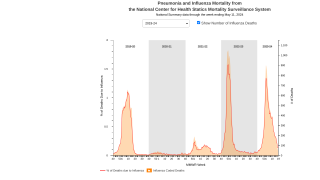Flu Shots Reduce Influenza Mortality by 31%

A new study from Australia revealed influenza vaccinations were 31 percent effective in reducing mortality for hospital-related flu cases.
But, if you do get the flu, these researchers found no evidence that the flu vaccine reduced the severity of influenza illness.
This study was published in Clinical Infectious Diseases on January 6, 2020, and was based on over 9,000 patient level-data sets between 2010 - 2017, from 4,038 patients admitted with lab-confirmed influenza to 17 Australian hospitals in the study.
The lead author of this study was Monica L. Nation, Infection and Immunity, Murdoch Children’s Research Institute, Melbourne, Australia, which concluded saying ‘This study reinforces the public health benefit of the influenza immunization program in protecting against mortality, as well as reducing the risk of hospitalization.’
This study’s findings are important to the 2019-2020 flu season in the Northern Hemisphere.
According to the new US Centers for Disease Control and Prevention (CDC) FluView report, there have been 27 pediatric fatalities associated with influenza viruses during the 2019-2020 flu season, as of January 3, 2020.
The CDC continues to endorse flu shots for most children older than 6 months of age.
A previous CDC’s study findings support this CDC recommendation in reducing pediatric related fatalities.
This study found influenza vaccination was associated with reduced risk of laboratory-confirmed, influenza-associated, pediatric death.
From July 2010 through June 2014, 358 laboratory-confirmed influenza-associated pediatric deaths were reported among children aged 6 months through 17 years. The vaccination status was determined for 291 deaths; 75 (26%) received the vaccine before illness onset.
How well the flu vaccine to prevent flu illness can vary from season to season, says the CDC.
The vaccine’s effectiveness also can vary depending on who is being vaccinated.
During years when the flu vaccine is not well matched to circulating influenza viruses, it is possible that little or no benefit from flu vaccination may be observed.
But, during years when there is a good match between the flu vaccine and circulating viruses, it is possible to measure substantial benefits from flu vaccination in terms of preventing flu illness and complications.
However, even during years when the flu vaccine match is good, the benefits of flu vaccination will vary, depending on various factors like the characteristics of the person being vaccinated, what influenza viruses are circulating that season and even, potentially, which type of flu vaccine was used.
While determining how well a flu vaccine works is challenging, in general, recent studies have supported the conclusion that flu vaccination benefits public health, especially when the flu vaccine is well matched to circulating flu viruses.
A more detailed explanation of U.S. flu burden and burden averted by seasonal flu vaccines is available from CDC’s Flu Burden page.
There are various influenza vaccines available at most US pharmacies for the 2019-2020 flu season. Financial support programs for flu shots can be found at Vaccine Discounts.
The CDC says 'vaccination decisions should be part of an ongoing discussion between a provider and patient.'
Flu shot news is published by Precision Vaccinations.
Our Trust Standards: Medical Advisory Committee

























